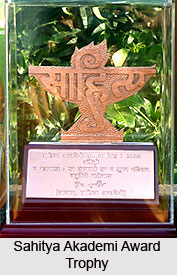 Sahitya Akademi Awards is considered the most esteemed and honoured awards have lent a sublimely elevated and exalted status to those gifted writers in all the 24 acknowledged regional languages in India. Likewise, Hindi being the national language of India, has been excelling with exceptional composers, their compositions and of course, gloriously redefining this very ancient Indo-Aryan language from the past.
Sahitya Akademi Awards is considered the most esteemed and honoured awards have lent a sublimely elevated and exalted status to those gifted writers in all the 24 acknowledged regional languages in India. Likewise, Hindi being the national language of India, has been excelling with exceptional composers, their compositions and of course, gloriously redefining this very ancient Indo-Aryan language from the past.
The enlisted personas can be stated as below:
| Year | Book | Author |
| 2009 | Hawa mein Hastakshar (Poetry) | Kailash Vajpeyi |
| 2008 | Kohre Mein Kaid Rang (Novel) | Govind Mishra |
| 2007 | Inhin Hathiyaron Se (Novel) | Amar Kant |
| 2006 | Sanshyatma (Poetry) | Gyanendrapati |
| 2005 | Kyap (Novel) | Manohar Shyam Joshi |
| 2004 | Dushchakra Mein Srista (Poetry) | Viren Dangwal |
| 2003 | Kitne Pakistan (Novel) | Kamleshwar |
| 2002 | Do Panktiyon Ke Beech (Poems) | Rajesh Joshi |
| 2001 | Via Bypass (Novel) | Alka Saraogi |
| 2000 | Hum Jo Dekhte Hain (Poetry) | Manglesh Dabral |
| 1999 | Deewar Main Ek Khirkee Rahathi Thi (Novel) | Vinod Kumar Shukla |
| 1998 | Naye Ilake Mein (Poetry) | Arun Kamal |
| 1997 | Anubhav Ke Aakash Mein Chand (Poetry) | Leeladhar Jagoori |
| 1996 | Mujhe Chand Chahiye (Novel) | Surendra Verma |
| 1995 | Koi Doosra Nahin (Poetry) | Kunwar Narain |
| 1994 | Kahin Nahin Wahin (Poetry) | Ashok Vajpeyi |
| 1993 | Ardhanarishwar (Novel) | Vishnu Prabhakar |
| 1992 | Dhai Ghar (Novel) | Giriraj Kishore |
| 1991 | Main Vaqt Ke Hun Samne (Poetry) | Girija Kumar Mathur |
| 1990 | Neela Chand (Novel) | Shiv Prasad Singh |
| 1989 | Akaal Mein Saras (Poetry) | Kedarnath Singh |
| 1988 | Aranya (Poems) | Naresh Mehta |
| 1987 | Magadh (Poems) | Shrikant Verma |
| 1986 | Apurva (Poetry) | Kedarnath Agarwal |
| 1985 | Kavve Aur Kala Pani (Short stories) | Nirmal Verma |
| 1984 | Log Bhool Gaye Hain (Poetry) | Raghuvir Sahay |
| 1983 | Khutiyon Par Tange Log (Poetry) | Sarveshwar Dayal Saxena |
| 1982 | Viklang Shraddha Ka Daur (Satire) | Harishankar Parsai |
| 1981 | Tap Ke Taye Hue Din (Novel) | Trilochan |
| 1980 | Zinda Rukh (Novel) | Krishna Sobti Zindaginama |
| 1979 | Kal Sunana Mujhe (Poetry) | Sudama Panday `Dhoomil` |
| 1978 | Utna Vah Suraj Hai (Poetry) | Bharat Bhushan Agarwal |
| 1977 | Chuka Bhi Hun Nahin Main (Poetry) | Shamsher Bahadur Singh |
| 1976 | Meri Teri Uski Baat (Novel) | Yashpal |
| 1975 | Tamas (Novel) | Bhisham Sahni |
| 1974 | Mitti Ki Baraat (Poetry) | Shivmangal Singh `Suman` |
| 1973 | Alok Parva (Essays) | Hazari Prasad Dwivedi |
| 1972 | Buni Huyi Rassi (Poetry) | Bhawani Prasad Mishra |
| 1971 | Kavita Ke Naye Pratiman (Literary criticism) | Namwar Singh |
| 1970 | Nirala Ki Sahitya Sadhana (Biography) | Ram Vilas Sharma |
| 1969 | Rag Darbari (Novel) | Shrilal Shukla |
| 1968 | Do Chattanen (Poetry) | Harivansh Rai Bachchan |
| 1967 | Amrit Aur Vish (Novel) | Amritlal Nagar |
| 1966 | Muktibodh (Novelette) | Jainendra Kumar |
| 1965 | Rasa Siddhanta (Treatise on poetics) | Nagendra |
| 1964 | Aangan Ke Par Dvar (Poetry) | S.H. Vatsyayan `Agyeya` |
| 1963 | Premchand: Kalam Ka Sipahi (Biography) | Amrit Rai |
| 1962 | No Award | No Award |
| 1961 | Bhoole Bisre Chitra (Novel) | Bhagwati Charan Verma |
| 1960 | Kala aur Burha Chand (Poetry) | Sumitranandan Pant |
| 1959 | Sanskriti Ke Char Adhyaya (A Survey of Indian culture) | Ramdhari Singh `Dinkar` |
| 1958 | Madhya Asia Ka Itihas (History) | Rahul Sankrityayan |
| 1957 | Bauddha Dharma Darshan (Philosophy) | Acharya Narendra Dev |
| 1956 | Padmavat Sanjivani Vyakhya (Commentary) | Vasudevasaran Agrawal |
| 1955 | Him Tarangini (Poetry) | Makhanlal Chaturvedi |




















